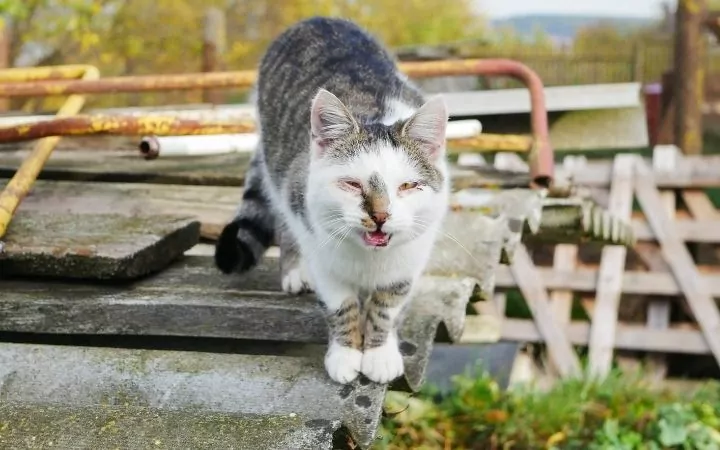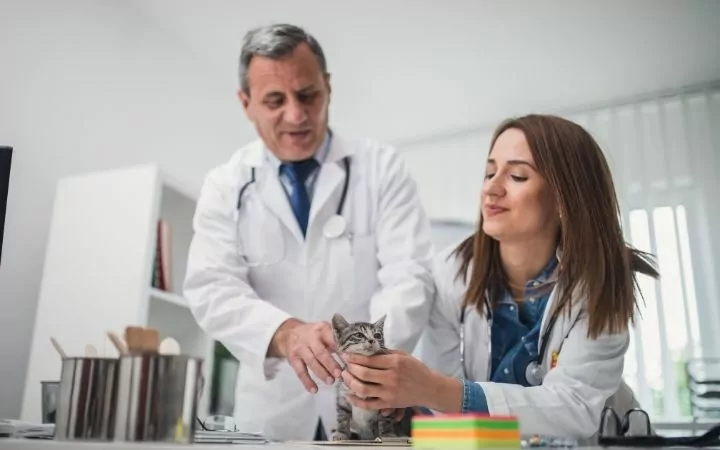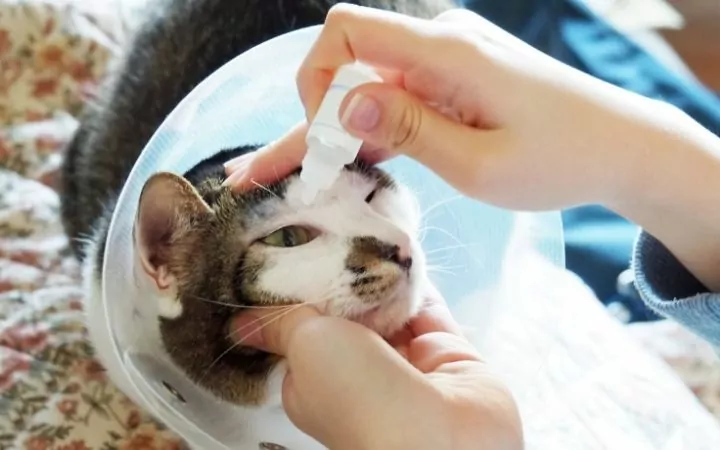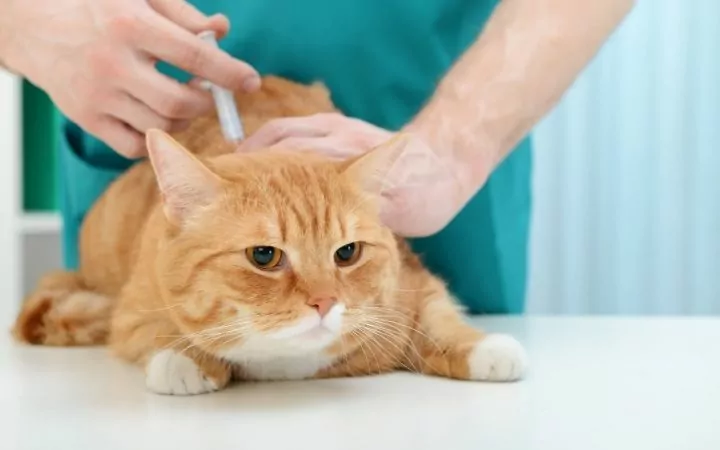Definition of the Feline Herpes Virus (FHV)
Most humans will recognize the name “herpes”’, but don’t worry, the feline herpes virus type 1 (FHV.1) is nothing like its human cousin. Feline herpes is known under names like cat herpes or feline viral rhinotracheitis (FVR). It is an infectious upper respiratory disease that can infect wild and domestic cats of all ages, and it is the most common cause of conjunctivitis in cats.
How do Cats Contract the Virus?

Feline herpes virus is very contagious and can affect any cat, but young kittens and immunosuppressed cats (cats with a compromised immune system) are more susceptible. It can spread through direct contact with discharge from an infected cat’s eyes, mouth, or nose. However, cat herpes can also spread through infected material, where a sick cat has come into contact and left discharge on it.
These infected objects can be anything from litter boxes, food, and water, to beds and hiding spots. A pregnant queen might also pass the virus on to her kittens in the womb!
As the feline herpes virus is so contagious, it is widespread in places where lots of cats live close together. Especially in catteries and shelters, feline herpes is a common occurrence.
To make matters even more complicated, most cats infected with the feline herpes virus will become latent carriers. Latent means that they carry the virus but show no symptoms. This isn’t an issue for all cats, but some will continue to shed the virus during stressful periods and thereby pose a risk for other cats.
Signs and Symptoms
As the virus is so contagious, it is essential for any cat owner to know the most common feline herpes virus symptoms.
Upper respiratory infection
Cats infected with the feline herpes virus often start by showing symptoms of an upper respiratory infection. Symptoms usually appear within two to five days of infection and include:
- Sneezing
- Nasal congestions
- Nasal discharge
Conjunctivitis

As the feline herpes virus affects the upper respiratory area, it will also infect the eyes and cause conjunctivitis, which is inflammation of the tissues surrounding the eyes. This will cause symptoms like:
- Excessive blinking
- Squinting
- Discharge from the eye, often containing pus.
Long-term infected cats can also experience keratitis, which is inflammation or infection of the cornea, which can, in turn, lead to corneal ulcers (minor cuts in the eye). In the worst cases, this can lead to blindness or chronic dry eyes, which can become very uncomfortable for the cat.
Other more generalized symptoms include:
- Fever
- Lethargy (tiredness)
- Anorexia (poor appetite)
Diagnosis of FHV
In many cases, a specific diagnosis isn’t necessary. The clinical signs are so typical that a presumptive diagnosis of feline herpes virus is often made with or without the feline calicivirus present.
If there are symptoms of a corneal infection (keratitis), a fluorescein staining of the eye will often be made to check for ulcers. A Schirmer tear test can also be made, as reduced tear production is associated with feline herpes virus conjunctivitis.
If a specific identification of the virus is necessary, a sample of cells and discharge can be taken from the cat’s eyes, throat, or nose. Hereafter a PCR-test can confirm the presence of the feline herpes virus.
However, it is crucial to remember that if the cat is latently sick and displays no clinical symptoms of cat herpes, the PCR-test might be negative.
Available Treatment Options

Remember always to seek a veterinarian’s guidance if you suspect that your cat is suffering from the feline herpes virus.
In many cases of the feline herpes virus, the process of the disease is uncomplicated and self-limiting. In mild cases, symptomatic treatment is the only thing necessary. Here treatment is determined based on the clinical signs, and these are treated alone.
The most important thing any owner can do is to be patient. There’s nothing really that will “cure” the virus from the cat’s system, but many cats will recover from the feline herpes virus over time, all on their own.
For cats suffering from many symptoms due to cat herpes, some antiviral medications are available to help alleviate the symptoms. The goal is to get the virus into remission so the immune system can suppress the symptoms. Famciclovir is a human anti-herpes virus drug that has been shown to have some effect on cats. It is administered orally and regularly to suppress the herpes virus.
Lysine is something else your veterinarian may recommend to curb the effects of the virus. It is a supplement and is given to inhibit the feline herpes virus-lifecycle. It should always be given with food, as it can otherwise cause vomiting. Lysine is rarely effective on its own, but can in combination with other drugs, make a big difference.
When a cat gets infected with the feline herpes virus, the immune system will, in effect, “focus on that.” That leaves the cat more open to the risk of secondary bacterial infections. In cases with clinical signs of bacteria infections, antibiotics may be necessary to treat them.
Antibiotics will often also be prescribed in severe keratitis cases, where secondary ulceration of the eye is diagnosed. In patients with severe eye-infection, Atropin can also be administered to control the pain in the eye. Atropine dilates the pupil in the eye, which can be uncomfortable for the cat but will relieve some of the pain associated with eye infections.

If you’re wondering if there’s anything you can do at home, there are a few things – besides lots of TLC – that may help your cat suffering from cat herpes:
- Clean the eyes and nose: If your cat allows it, remove any dried-up discharge carefully.
- Get a humidifier: A humidifier or steamy bathroom may relieve some of the congestion your cat is experiencing.
- Calm and quiet: No one likes noise or unwanted attention when they’re sick. That goes for our cats as well as us. Make sure your cat can rest in peace.
The feline herpes virus has no actual treatment or cure. In the end, most cats will become latent carriers of the virus. Some will never have another episode with clinical signs, whereas others will. There’s no way of telling. Luckily, most cats will recover fully from the clinical signs, some on their own and some with the help of a veterinarian.
Are Other Cats in the Household at Risk?
The short answer? Yes.
Feline herpes virus is exceptionally contagious. A contaminated environment can be infectious for up to 48 hours. So make sure you keep any healthy cats far away from the infected cat. You will need to keep them apart for a long time. Cats showing acute symptoms of the herpes virus are likely to be contagious for up to three weeks!
You should also make sure to wash your hands thoroughly after petting the infected cat, as you may carry the virus on your hands and might transmit it to the other cats.
The better news is that the feline herpes virus is, as the name suggests, only able to infect cats. There’s no risk for you, your family, or the family dog.
FHV Preventative Measures

The best prevention against the feline herpes virus is vaccinations! The standard core vaccinations in most countries include a shot of vaccine against cat herpes. The vaccine will not wholly prevent an infection from occurring, but it will significantly reduce the symptoms’ severity.
A cat should be vaccinated at least three times, starting from when they are eight weeks old. These will then need to be boosted regularly, with most veterinarians recommending once every year.
Another important preventive measure is to prevent and reduce flare-ups. Once your cat has become infected, it will likely have flare-ups, but these can be reduced in quantity and severity.
Cat herpes clinical symptoms are reactivated when the cat experiences stress. A low- or no-stress environment should reduce flare-ups immensely. Your cat can become stressed due to sudden changes in its environment, household occupant, or daily routine. You know your cat better than anyone and probably know what exactly makes them tick!
Complications Associated with the Feline Herpes Virus
The cat herpes virus is the most common cause of conjunctivitis. That, on its own, is uncomfortable but rarely dangerous for the cat. However, it can lead to corneal infections with cloudiness, redness of the eye, and corneal ulcers, which can be very painful.
These corneal ulcers can, in some cases with the feline herpes virus, cause complications:
- Corneal sequestration (breaking down of the cornea)
- Scarring of the eye
- Chronic tearing
- Entropion (inward rolling of the eyelids)
In the most persistent cases, the above can lead to blindness. This is why it is crucial to notice if your cat shows initial signs of a flare-up of cat herpes (respiratory signs like sneezing or nasal discharge). Especially with a history of severe eye infections, you should contact your veterinarian immediately.
Summary
Feline herpes virus, FHV-1, or cat herpes? Whatever you choose to call it, you will likely encounter it at some point in your life as a cat owner. After all, it is one of the most common reasons cats present in any veterinary clinic with conjunctivitis.
Luckily, that also means most vets know it well and know exactly what to do to help you and your furry friend as soon as possible!
